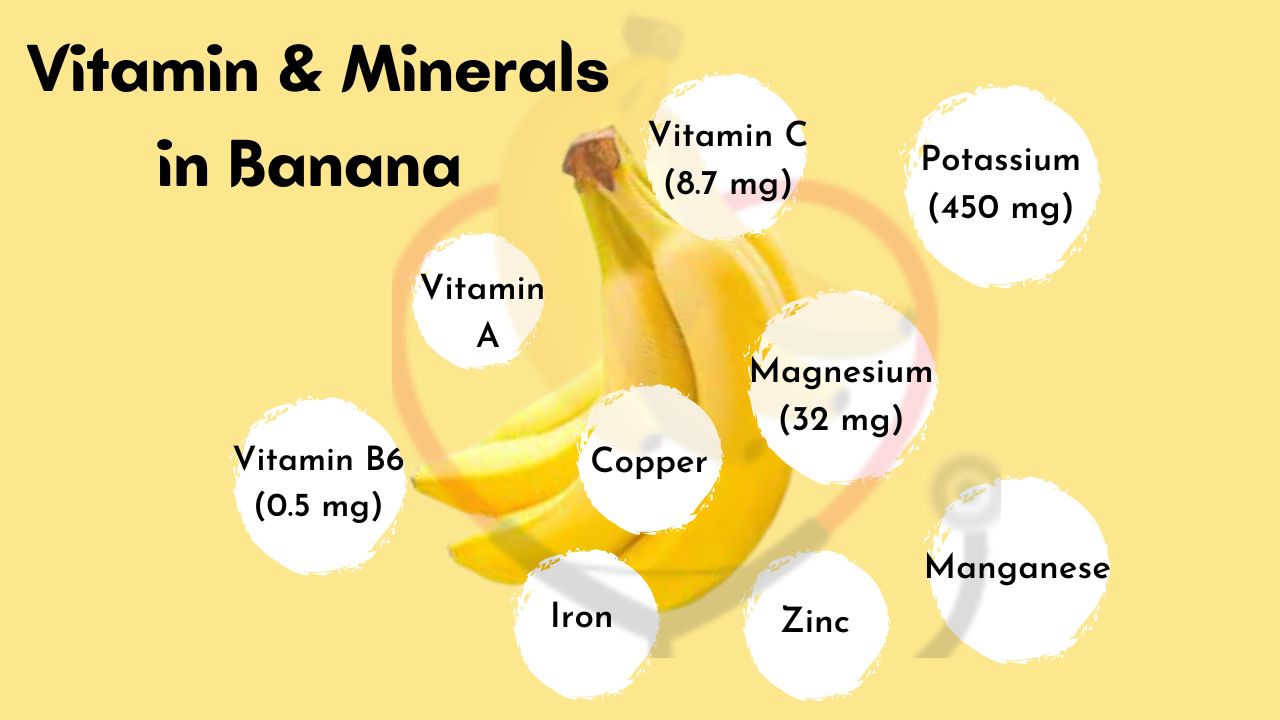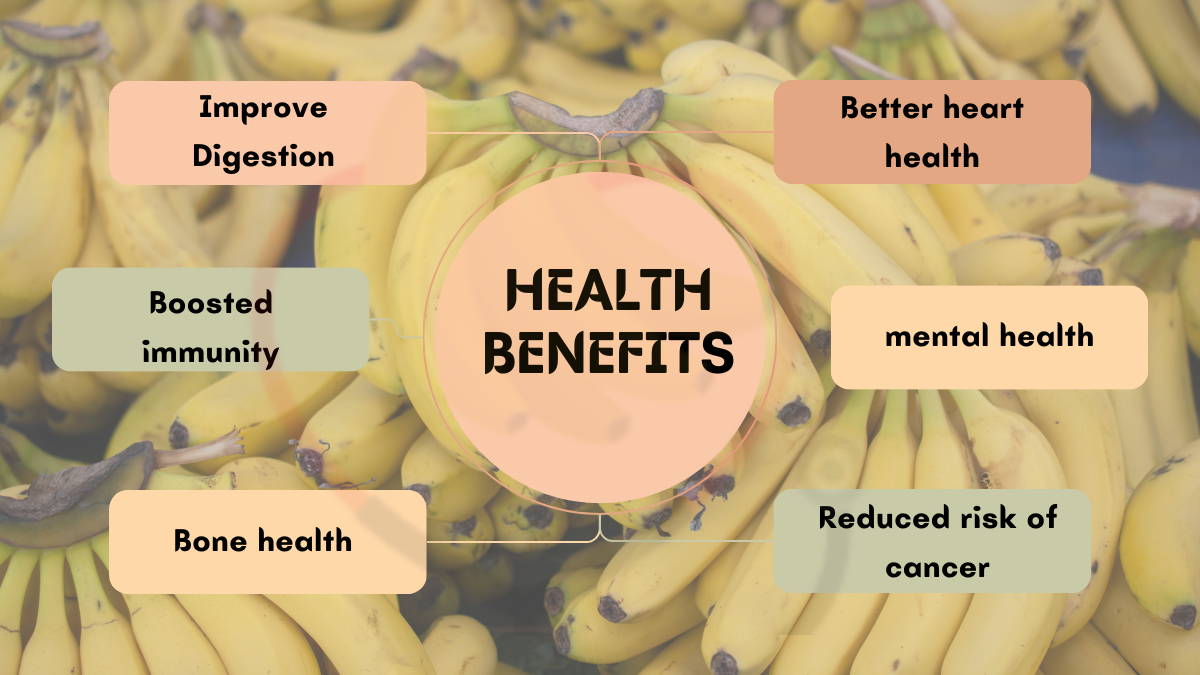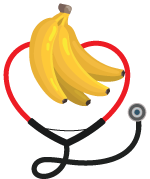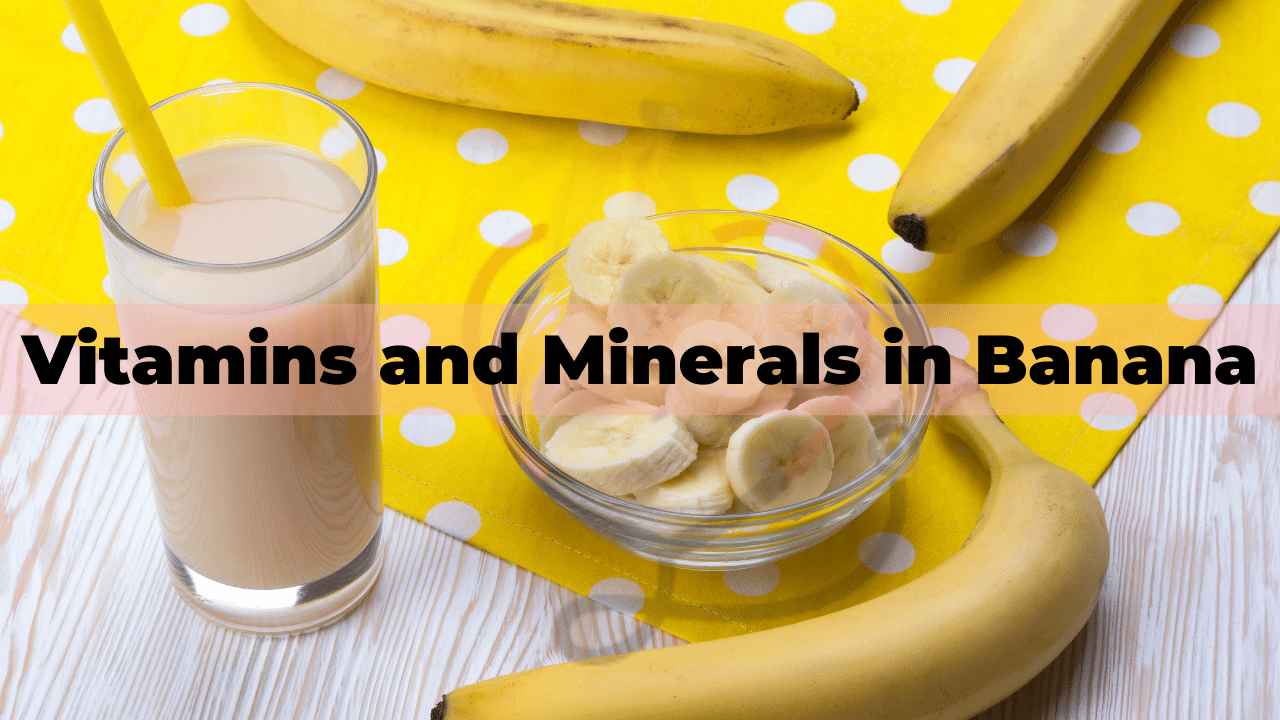Written By Sania Malik || Reviewed By Adeel Abbas
Vitamins and minerals in banana are essential nutrients that the body requires to function properly. Vitamins are organic compounds that the body needs in small amounts to maintain good health.[1]
There are 13 different vitamins, including vitamins A, C, D, E, K, and B vitamins.
Minerals, on the other hand, are inorganic compounds that the body needs in varying amounts. [2] There are 16 essential minerals, including potassium, calcium, iron, and zinc.
In this article we will talk about the benefits of vitamins and minerals in banana.

Vitamins and Minerals in Banana
Vitamins in Bananas
Bananas are a good source of several vitamins, including vitamin C, vitamin B6, and vitamin A.
1: Vitamin C (8.7 mg)
Bananas are a good source of vitamin C, which is an antioxidant that helps protect cells from damage caused by free radicals. [3] Vitamin C also plays a vital role in immune function, wound healing, and the production of collagen, which is necessary for healthy skin and bones.
2: Vitamin B6 (0.5 mg)
Bananas are also a rich source of vitamin B6, which is essential for the metabolism of proteins and carbohydrates. [4]
Vitamin B6 also helps the body produce neurotransmitters, which are chemicals that transmit signals in the brain.
Adequate levels of vitamin B6 are also important for a healthy immune system and the formation of red blood cells.
3: Vitamin A
Bananas contain small amounts of vitamin A, which is important for good vision, a healthy immune system, and the maintenance of healthy skin and mucous membranes. [5]
Minerals in bananas
Bananas are also a good source of several minerals, including potassium, magnesium, manganese, copper, iron, and zinc.
1: Potassium (450 mg)
Potassium is an essential mineral that is abundant in bananas. It plays a vital role in maintaining fluid balance in the body, regulating blood pressure, and supporting proper muscle and nerve function. [6]
Adequate potassium intake may also help reduce the risk of stroke and kidney stones.
2: Magnesium (32 mg)
Bananas are also a good source of magnesium, which is necessary for many functions in the body, including muscle and nerve function, blood sugar regulation, and blood pressure control. [7]
Magnesium also plays a role in bone health and may help reduce the risk of osteoporosis.
3: Manganese
One medium-sized banana contains approximately 13% of the daily recommended intake of manganese.
Manganese is important for healthy bone development, wound healing, and the metabolism of carbohydrates, amino acids, and cholesterol.
4: Copper
Bananas contain small amounts of copper, which is important for the production of red blood cells, the absorption of iron, and the maintenance of healthy bones and connective tissue.
5: Iron
One medium-sized banana contains approximately 2% of the daily recommended intake of iron. Iron is essential for the production of red blood cells and the transport of oxygen throughout the body.
6: Zinc
Bananas contain small amounts of zinc, which is important for the immune system, wound healing, and the metabolism of carbohydrates, protein, and fat.
7: Fiber (2.6 g)
Besides their vitamin and mineral content, bananas are also an excellent source of fiber, which is important for good digestive health. [8] Fiber helps promote regular bowel movements, prevent constipation, and regulate blood sugar levels.
8: Folate (24 mcg)
This vitamin is essential for the production of red blood cells and the formation of DNA. It is particularly important for pregnant women, as it helps to prevent birth defects.
Health benefits of vitamins and minerals in Banana

1: Improved digestion
Bananas contain a significant amount of dietary fiber, which can help regulate digestion and prevent constipation. They also contain prebiotics, which are essential for promoting the growth of healthy gut bacteria.
2: Boosted immunity
The vitamin C and other antioxidants found in bananas help boost the immune system and protect the body from harmful pathogens.
3: Better heart health
The potassium found in bananas is essential for maintaining healthy blood pressure levels, which in turn reduces the risk of heart disease and stroke.
4: Reduced risk of cancer
The antioxidants and other compounds found in bananas have been shown to have anti-cancer properties, particularly in reducing the risk of colorectal cancer.
5: Improved mental health
The vitamin B6 found in bananas is important for brain development and function, and has been shown to improve mood and reduce symptoms of depression.
6: Better bone health
The minerals found in bananas, including magnesium, manganese, and potassium, are important for maintaining healthy bone structure and reducing the risk of osteoporosis.
There are different other benefits of vitamins and minerals in banana for human health.
Incorporating these vitamins and minerals in banana into your diet can provide several health benefits, including improved digestion, boosted immunity, better heart health, and reduced risk of cancer.
Eaten on their own or added to recipes, bananas are a versatile and easy way to promote good health.
Adding vitamins and minerals in banana to your diet can provide a delicious and nutritious way to support your overall health and well-being.
They are a good source of energy, low in calories and fat, and can be enjoyed in a variety of ways, from eating them fresh to adding them to smoothies or baked goods.
FAQs
Are there any health benefits to eating bananas every day?
Yes, bananas are a healthy and nutritious fruit that can be eaten every day as part of a balanced diet. They are rich in vitamins, minerals, and fiber, and provide a quick and easy source of energy.
Can bananas help to lower blood pressure?
Yes, bananas are a good source of potassium, which is essential for maintaining healthy blood pressure.
Can bananas help to improve digestion?
Yes, bananas are a good source of fiber, which helps to support healthy digestion. They also contain enzymes that can help to break down carbohydrates and promote the absorption of nutrients.
Are bananas good sources of vitamin C?
Yes, bananas contain vitamin C, which is an important antioxidant that helps to protect cells from damage caused by free radicals.
Can bananas help to improve athletic performance?
Yes, bananas are a good source of carbohydrates, which provide quick energy for physical activity. They also contain potassium, which can help to prevent muscle cramps and support healthy muscle function.
Can bananas help with weight loss?
Bananas are relatively high in sugar and calories, they are also a good source of dietary fiber, which can help regulate digestion and promote feelings of fullness. As with any food, moderation is key when incorporating bananas into a weight loss diet.
Can eating too many bananas be harmful?
Bananas are generally considered safe to eat, consuming large amounts of bananas (more than 10 per day) can lead to an excess of potassium in the body, which can be harmful to individuals with kidney problems.
Are bananas good sources of energy?
Yes, bananas are a good source of natural energy, thanks to their high content of carbohydrates and other essential nutrients.
Can bananas improve skin health?
Yes, the vitamin C and other antioxidants found in bananas can help promote healthy skin and prevent damage caused by free radicals.
Can bananas be part of a gluten-free diet?
Yes, bananas are naturally gluten-free and can be a good source of nutrition for individuals following a gluten-free diet.

